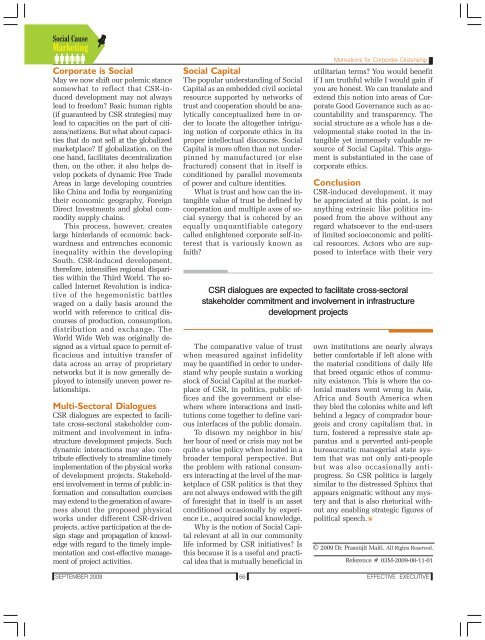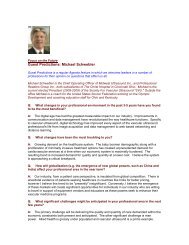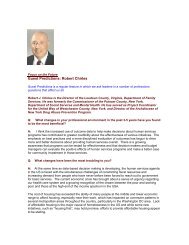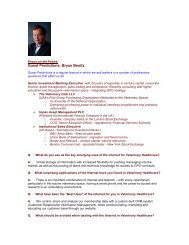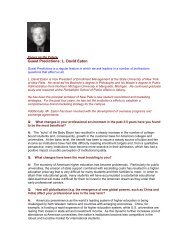Social Cause Marketing - The Regis Group Inc
Social Cause Marketing - The Regis Group Inc
Social Cause Marketing - The Regis Group Inc
Create successful ePaper yourself
Turn your PDF publications into a flip-book with our unique Google optimized e-Paper software.
Corporate is <strong>Social</strong><br />
May we now shift our polemic stance<br />
somewhat to reflect that CSR-induced<br />
development may not always<br />
lead to freedom? Basic human rights<br />
(if guaranteed by CSR strategies) may<br />
lead to capacities on the part of citizens/netizens.<br />
But what about capacities<br />
that do not sell at the globalized<br />
marketplace? If globalization, on the<br />
one hand, facilitates decentralization<br />
then, on the other, it also helps develop<br />
pockets of dynamic Free Trade<br />
Areas in large developing countries<br />
like China and India by reorganizing<br />
their economic geography, Foreign<br />
Direct Investments and global commodity<br />
supply chains.<br />
This process, however, creates<br />
large hinterlands of economic backwardness<br />
and entrenches economic<br />
inequality within the developing<br />
South. CSR-induced development,<br />
therefore, intensifies regional disparities<br />
within the Third World. <strong>The</strong> socalled<br />
Internet Revolution is indicative<br />
of the hegemonistic battles<br />
waged on a daily basis around the<br />
world with reference to critical discourses<br />
of production, consumption,<br />
distribution and exchange. <strong>The</strong><br />
World Wide Web was originally designed<br />
as a virtual space to permit efficacious<br />
and intuitive transfer of<br />
data across an array of proprietary<br />
networks but it is now generally deployed<br />
to intensify uneven power relationships.<br />
Multi-Sectoral Dialogues<br />
CSR dialogues are expected to facilitate<br />
cross-sectoral stakeholder commitment<br />
and involvement in infrastructure<br />
development projects. Such<br />
dynamic interactions may also contribute<br />
effectively to streamline timely<br />
implementation of the physical works<br />
of development projects. Stakeholdersí<br />
involvement in terms of public information<br />
and consultation exercises<br />
may extend to the generation of awareness<br />
about the proposed physical<br />
works under different CSR-driven<br />
projects, active participation at the design<br />
stage and propagation of knowledge<br />
with regard to the timely implementation<br />
and cost-effective management<br />
of project activities.<br />
<strong>Social</strong> Capital<br />
<strong>The</strong> popular understanding of <strong>Social</strong><br />
Capital as an embedded civil societal<br />
resource supported by networks of<br />
trust and cooperation should be analytically<br />
conceptualized here in order<br />
to locate the altogether intriguing<br />
notion of corporate ethics in its<br />
proper intellectual discourse. <strong>Social</strong><br />
Capital is more often than not underpinned<br />
by manufactured (or else<br />
fractured) consent that in itself is<br />
conditioned by parallel movements<br />
of power and culture identities.<br />
What is trust and how can the intangible<br />
value of trust be defined by<br />
cooperation and multiple axes of social<br />
synergy that is cohered by an<br />
equally unquantifiable category<br />
called enlightened corporate self-interest<br />
that is variously known as<br />
faith?<br />
CSR dialogues are expected to facilitate cross-sectoral<br />
stakeholder commitment and involvement in infrastructure<br />
development projects<br />
<strong>The</strong> comparative value of trust<br />
when measured against infidelity<br />
may be quantified in order to understand<br />
why people sustain a working<br />
stock of <strong>Social</strong> Capital at the marketplace<br />
of CSR, in politics, public offices<br />
and the government or elsewhere<br />
where interactions and institutions<br />
come together to define various<br />
interfaces of the public domain.<br />
To disown my neighbor in his/<br />
her hour of need or crisis may not be<br />
quite a wise policy when located in a<br />
broader temporal perspective. But<br />
the problem with rational consumers<br />
interacting at the level of the marketplace<br />
of CSR politics is that they<br />
are not always endowed with the gift<br />
of foresight that in itself is an asset<br />
conditioned occasionally by experience<br />
i.e., acquired social knowledge.<br />
Why is the notion of <strong>Social</strong> Capital<br />
relevant at all in our community<br />
life informed by CSR initiatives? Is<br />
this because it is a useful and practical<br />
idea that is mutually beneficial in<br />
Motivations for Corporate Citizenship<br />
utilitarian terms? You would benefit<br />
if I am truthful while I would gain if<br />
you are honest. We can translate and<br />
extend this notion into areas of Corporate<br />
Good Governance such as accountability<br />
and transparency. <strong>The</strong><br />
social structure as a whole has a developmental<br />
stake rooted in the intangible<br />
yet immensely valuable resource<br />
of <strong>Social</strong> Capital. This argument<br />
is substantiated in the case of<br />
corporate ethics.<br />
Conclusion<br />
CSR-induced development, it may<br />
be appreciated at this point, is not<br />
anything extrinsic like politics imposed<br />
from the above without any<br />
regard whatsoever to the end-users<br />
of limited socioeconomic and political<br />
resources. Actors who are supposed<br />
to interface with their very<br />
own institutions are nearly always<br />
better comfortable if left alone with<br />
the material conditions of daily life<br />
that breed organic ethos of community<br />
existence. This is where the colonial<br />
masters went wrong in Asia,<br />
Africa and South America when<br />
they bled the colonies white and left<br />
behind a legacy of comprador bourgeois<br />
and crony capitalism that, in<br />
turn, fostered a repressive state apparatus<br />
and a perverted anti-people<br />
bureaucratic managerial state system<br />
that was not only anti-people<br />
but was also occasionally antiprogress.<br />
So CSR politics is largely<br />
similar to the distressed Sphinx that<br />
appears enigmatic without any mystery<br />
and that is also rhetorical without<br />
any enabling strategic figures of<br />
political speech.<br />
© 2009 Dr. Prasenjit Maiti. All Rights Reserved.<br />
Reference # 03M-2009-08-11-01<br />
SEPTEMBER 2009<br />
66<br />
EFFECTIVE EXECUTIVE


